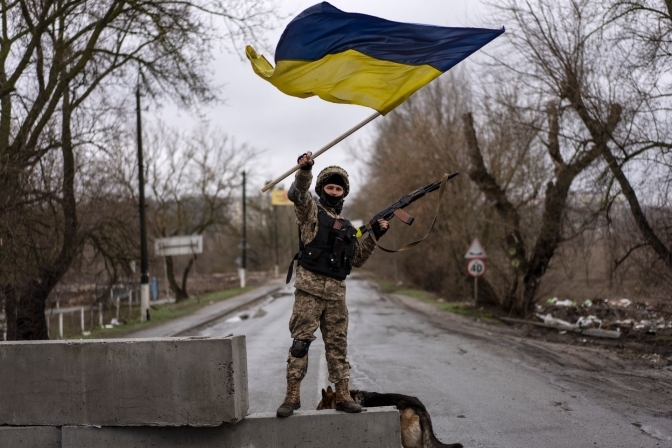
[For daily insights from throughout Ukraine, follow Ukrainian Freedom News on Telegram]
Today, it seems that all notable Russian media persons consider it necessary to say that Ukraine, Ukrainians, including Zelenskyi, have betrayed the memory of their grandparents and great-grandparents, the memory of a great victory. Can we say that Ukrainians are doing this, that you are personally betraying the memory of your grandparents in some way? Obviously, for him, this war had some other dimension.
No one betrays anything! Let’s be honest.
I will start with the facts. The capitulation was signed at Rheims on May 7 and in Karlshorst on May 8. These two documents came into force at 11:01 p.m. on May 8, 1945. The only thing is that, although I don’t remember exactly where, I saw tonight that on May 9, the Soviet authorities decided to announce their victory to their people. But nothing crucial happened that day. In 1947, May 9 canceled as a day off, even in the Soviet Union, and moved to the New Year. Already in 1947, this victory meant almost neither politically nor ideologically for the Soviet government. It was just another day. We know that in the Soviet Union, only a day off was considered a holiday. Unfortunately, it moved to the territory of Ukraine.
Now we have to talk about the fact that the Russian-Ukrainian war in the Ukrainian national mythology, in the good sense of the word, will knock out the Second World War. Because we finally got a real modern war for independence with real heroes, traitors, passions, tragedies, rescues, and fun. We are now in the same state that our grandfathers were in, and for some, great-grandfathers, after the end of that war. That is, we can understand them now after 80 years. At the same time, there will be certain conditions because we live in a democratic state, and they live in a power that is very difficult to call democratic. But this does not diminish the taste of victory. And to this taste of win was always added the bitterness of losses and the understanding of how it happened. I know how it happened in my and my wife’s family, where this day was not a holiday. If our families got together, then in ours, and many families I know, it was a memorial dinner. They remembered those who died. My grandfather had only one toast – «For those who did not come.» These were memories or conversations attempts to let it pass through themselves, but in no way is what is happening in Russia now. Now it is not customary to give sentiments to the USSR, but I must admit that in the USSR, this day was much more humane than in Russia.
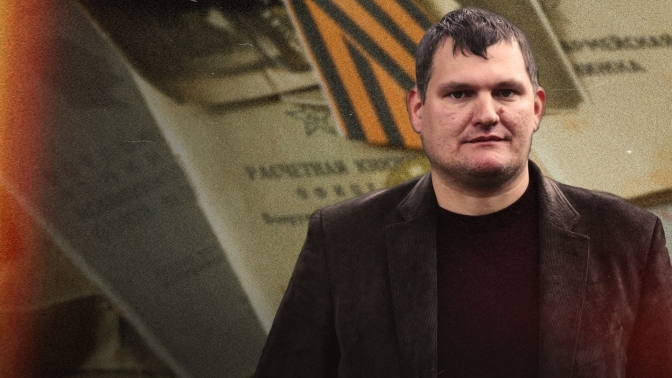
As a student, I saw a film that impressed me. It was an adaptation of Gunter Grass’s novel The Tin Drum. Red Army soldiers capture a German city and start raping and robbing everyone in a row at the end of the film. It looks like a terrible massacre. I mention this because in those days in Germany, in Berlin, Ukrainians and Russians were forbidden to go out with national flags. But the Russians did it on May 8. In some cities, different Russians came out because some chased those who came out with the tricolor, the Z symbol, and St. George’s ribbons. They support this war and are now betraying the memory of their grandfathers who fought against Nazism. Because they support the new Nazism, fascism, or racism, as it is now officially called in Ukraine. Doesn’t this mean that the second ones, the «good Russians,» still live in mythologies about the «liberating Red Army»?
It fits the paradigm that the current war showed the true face of the Russian or Soviet army. It perceives as rumors, unverified information, but now we see it live. Again there are references to how the Red Army behaved in Lviv in September and October 1939. There are references to how the «liberators» soldiers acted in various Ukrainian territories in 1943 and 1944. There are many references to the mass rape of Soviet women who were Ostarbeiterka or held captive when they passed through the filtering points. We have already seen all these crimes in the textbooks, Buchi, Irpeni, Izyumi, all this inhuman treatment, excuse me for the term. The information about Russian crimes comes from the temporarily occupied territories as soon as Ukrainian liberates them. The history of Russian crimes, I think, will turn out to be no less than the history of the crimes of the Nazis in these territories. But, in principle, in this situation, I would not compare the Russians with the Nazis. Because when the Nazi Party did not exist, Soviet Russia occupied Ukraine. And if the same residents of Buchi, I do not want to offend anyone, read about what happened in Buchi in 1917-1920, when the Soviet troops entered there, what happened in Kyiv, Kharkiv, Odesa, these massacres, torture, destruction of the intelligentsia and any people in general. We see it all now. I believe the stories about the extermination list that the Russians had because I know what happened in their previous visits. We should finally move away from comparing the Russians with the Nazis – they should compare either with the Soviet troops or with the Russian army of different times that came to the territory of Ukraine and Poland.
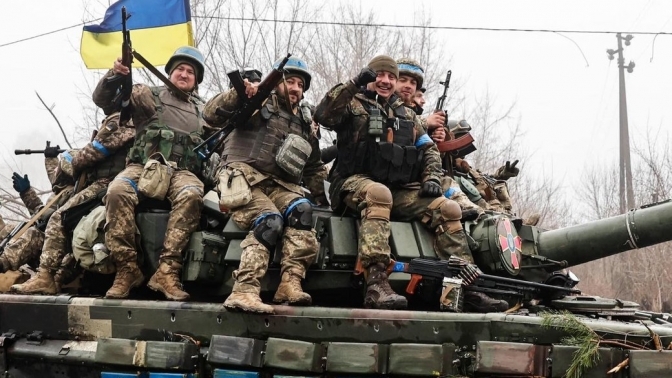
Do you think these parallels are harmful?
There are no harmful parallels, only a noxious perception. We, our society, and the media community pay little attention to many points which are clearly in Russia. There is such a «character» as Anton Vaino, an Estonian who is the head of the administration of the president of the Russian Federation. He has a lot of ideological works, one of which is the strategy of victory. He determines that any modern war fought over the right to call a spade a spade. Our war is a classic example of us calling that spade a spade in the end. I hope that shortly, the period of the Ukrainian SSR as part of the Soviet Union will be called the period of Soviet occupation. Yes, it was a collaborative state. Yes, there were many Ukrainians who found their place in this country. But it was not a free Ukrainian state. Therefore, as soon as we define clear parameters and admit our mistakes, it will be easier for us to act and live in the future. All European nations underwent their historical cleansing at different events. Britain went through it, paying homage to the British Empire, losing it. France rethought the Second World War and lost the colonial empire, the United States of America – rethinking its history, the Indian question, and the question of the black population. Poland is now very supportive of us. We must give credit, although we have many unresolved historical issues with them. We will be able to say that the Polish and Ukrainian nations have become more mature when we can discuss these issues in the scientific circle and the public dimension. Because sooner or later everything that is not said turns into what we see in the current situation with Russia.
We often said: let’s leave historical problems, the history of Poles and Ukrainians, to historians. But we see that it was difficult for historians to agree. It led us to the fact that neither we nor the Poles discussed this with the public. Our discourses are sometimes so different that Poles merely do not understand us, and we do not understand them. They think the UPA was almost a state army that destroyed Poles on behalf of the state and all Ukrainians. They do not realize that for residents of Volyn, the events in Volyn are very distant. They did not participate in them, and they are not concerned about them yet.
Mr. Andriy, I will tell you, a Galician, as a resident of the Dnipro region, that the events of Volyn are absent from the global Ukrainian historical consciousness of other regions besides Volyn. We should discuss this issue at the state, political, and everyday levels. Then we will have to cooperate with the Poles in the same way. I don’t want to offend anyone, but I will be as politically incorrect as possible – this is not an exceptional situation. There is a great book that I would recommend reading. Unfortunately, it is widely available in Russia. It is a study by an English historian called «England and France. We love to hate each other». It contains many pages from the general history of these countries. And we should look at our relations with Poland, Hungary, and eventually Russia, whether we want to or not. We live surrounded by someone. We need to understand the issues with them. If we do not engage it in a dialog or at least understand them.
I was born in Siberia. But if we are talking about Lviv, then in modern Ukrainian history, a spontaneous cemetery has appeared on the Field of Mars, where soldiers are buried after dying for the freedom of this country, for its independence. Mars Field near the Lychakiv Cemetery, almost in the city center, was a military burial site during the First World War. There were Austrian, Ukrainian, and Polish soldiers lying side by side. And the first thing the Soviets did was to demolish it all, dig it up, and sometime in the 1950s, to a certain extent. We cannot be sure that the people whose names are on the gravestones are buried there. But this old cemetery will be restored.
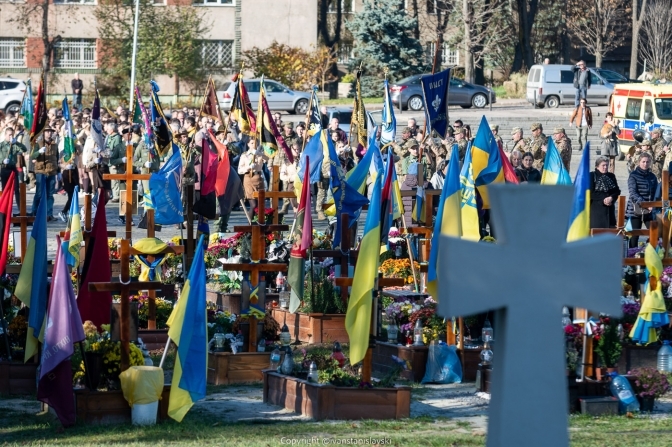
Kyiv has now decided that this cemetery will be in Bykivnia. At the same time, there is a large memorial on the Pechersk hills, covering several hectares, with a pompous figure of the «motherland,» which they are trying to somehow Ukrainize. It is illuminated in blue and yellow, and the coat of arms is changed. How good is this approach, when we leave the central element of the imperial presence, their historical memory, narrative, and a significant myth in the center, simply by putting a wreath on the head of this «motherland» or changing the coat of arms of the Union to a trident? Does it work like that? Are we talking about this myth of the «Great Patriotic War» in Ukraine?
In principle, working with space and territory is significant. You mentioned the story of Lviv’s Mars Field, which remained the field under any government, i.e., a burial place for soldiers. It’s much easier to work with a territory with clear signs used in this way. As far as I know, this Mars Field is to become a Ukrainian national military pantheon within Lviv. It is logical because people don’t need to explain anything. The authorities are closing one of the communication points. And then there is a rethinking of this moment. You mentioned the First World War. Ukrainians, the same Galicians, Lviv residents, fought either the Ukrainian SS Legion or the army of the Austro-Hungarian Empire. Later, Ukrainians fought in the Galician Army in the Ukrainian People’s Republic Army, the Ukrainian Military Organization, and the Ukrainian Insurgent Army. All these people who fought for Ukrainian statehood, who had Ukraine in their hearts, have the right to be buried and commemorated here. The appearance of the graves of the participants of the current war at this site merely builds a bridge of unity. It is a connection of generations, as they like to say.
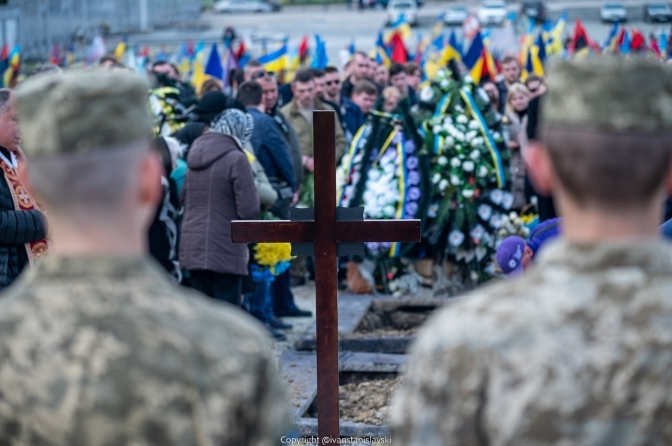
Mars Field in Lviv
But there are some questions about Kyiv. Bykivnia will be exclusively a national war memorial cemetery, a burial place. There is no final decision on a pantheon yet. The President studied the petition and gave instructions to work on it. For me, Askold’s grave as the location of the national pantheon does not evoke any sentiment.

Bykivnia Graves National Historical and Memorial Reserve
As for rethinking the area around the National Museum of the History of Ukraine in the Second World War, which you mention, it is also quite interesting. There are interesting natural elements that are used there, there is a large territory, and for Kyivans and Ukrainians in general, it is a place of military power, no matter how one treats it. And here is a question for those people who work with meanings because they still have to rethink and change something. And in our country, these changes do not always happen quickly. To do this, we need to understand the experience of different countries, for example, the experience of Britain Empire and Scotland, which was part of the empire. You will get a slap in the face if you call a Scotsman an Englishman. But every Scotsman is proud to be British. And there is another point here. Today we are talking about the military component, rethinking our military past of the empire. We have to «bite off» our piece here to make it clear that even in such moments when Ukraine did not have statehood. They fought in entirely different ways: the imperial army or national military formations. Either Ukrainians in the Russian imperial army or the Ukrainian Insurgent Army were skilled soldiers. As were the Ukrainians of the Ukrainian Insurgent Army, the United States Marines who landed on Okinawa, and the Ukrainians of the 82nd Parachute Division in Vietnam. We need to rethink, to grow up. Rethinking the Second World War is relatively curious because it hardly affects anyone personally.
About 15 years ago, one of the channels aired a movie that had a pretentious annotation that it was the first Ukrainian look at World War II (a nine-part documentary called War. The Ukrainian Account» by Serhiy Burkovsky in 2002 – Ed.) Some time has passed. Has this view been formulated? What is our vision for the Ukrainian account? As the historian Volodymyr Viatrovych says, the average Ukrainian will read the history book to the end in a school history textbook. Is this view, if it exists, reflected in the book?
The program now changed. Ukrainian participation in all formations of World War II should be considered, both in the armies of the countries of the Anti-Hitler Coalition and in the armed forces of Nazi Germany. We shouldn’t be ashamed to talk about this. We have to talk about all the issues. It is what makes us mature.
The movie «War. The Ukrainian Account» is extremely interesting, and it deals with a large number of issues. There should be dozens of such films for absolutely different events. There should be cycles dedicated to the occupation, collaboration, resistance movements, and hostilities. They are all completely different. We need to rethink this. You gave an example of documentary cinema, which I have followed professionally for the last 20 years. Even in Western countries, there have already been several rather radical changes in the description of the Second World War, even in documentary filmmaking. I’m not talking about the fact that the Far East and China, where the war lasted from 1931 and where Ukrainians were involved, are entirely out of our public consciousness. Now we are facing what Volodymyr Viatrovych says: a history textbook is a single book. Therefore, it should not overload with facts, and it should design so that Ukrainians understand not only their place in the world but also the course of events in the world, at least globally. For a long time, our historical education was still Moscow-centered. We did not consider issues that did not affect Moscow. As a result, we have continents about which our citizens know nothing. Or some countries that they should know about. For example, we had a news story about the appointment of an ambassador to Bulgaria. What does the average Ukrainian know about the history of Bulgaria, the problems of this country, how to work there, the peculiarities of historical memory, Ukrainian-Bulgarian ties, and the Russian component country’s history? And so on for virtually every country. Therefore, the transformation of historical education and the integration of world stories into it is a crucial point that will help us heal the trauma of the Second World War.
Just like the beginning of Nazism as an ideology, it is connected to the pseudo-science of eugenics, which was associated with the colonizing activities of the Germans in the late nineteenth-century in Africa. They created the first concentration camps there. I read about this in Ferguson’s book. It opens up a completely different view and perspective and gives more understanding. Yaroslav Hrytsak says we need to move more toward the history of explanation and interpretation rather than facts. How can his concept of overcoming the past be possible in a country where everyone somehow knows who Witte was, who still has a plaque in Kyiv, but no one remembers the names of the Habsburg prime ministers who did crucial things?
Without going too deeply into this discussion, which could last for hours, I can say this: we need to overcome the past in its various manifestations to win, whether it is the fascination in Eastern Ukraine with the imperial period of the Russian era. The fascination in Western Ukraine with the period of «Grandma Austria,» which was not so kind to Ukrainians. There are different aspects here: someone has to overcome Russian or Soviet nostalgia, and someone has to overcome Austrian nostalgia. And then we have to form a genuinely Ukrainian view of our history. We don’t have to apologize or be ashamed but merely call all these things by their proper names for ourselves, and then it will be much easier. We are ashamed of our crimes, and every nation has had them. We are ashamed of our heroism: how can we show heroism in such a situation? We are ashamed of our achievements. Perhaps the Ukrainian nation needs collective historical psychotherapy from the point of view of history to overcome historical traumas. We have the trauma of the Holodomor the OUN-no matters how much one might want to say that this is heroism, World War II, Afghanistan, and the trauma of this war. All these historical traumas can break powerful nations. We need to prepare so that later, after the victory, we don’t get torn apart at some point because we can’t understand it.
Translated by Yulian Lahun
Follow us on Facebook and Instagram. Lviv Now is an English-language website for Lviv, Ukraine’s «tech-friendly cultural hub.» It is produced by Tvoe Misto («Your City») media-hub, which also hosts regular problem-solving public forums to benefit the city and its people.











